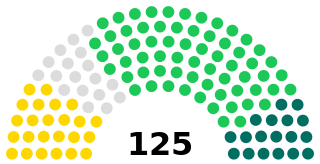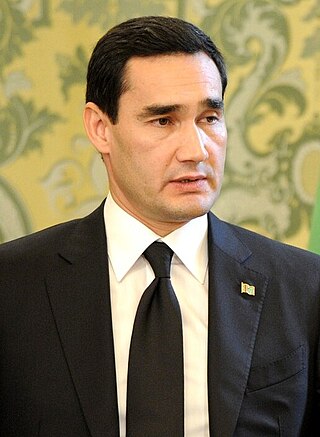
The history of Turkmenistan traditionally began with the arrival of Indo-European Iranian tribes around 2000 BC. Early tribes were nomadic or semi-nomadic due to the arid conditions of the region, preventing widespread adoption of agriculture. The steppe culture in Central Asia was an extension of a larger Eurasian series of horse cultures which spanned the entire spectrum of language families, including the Indo-Europeans and Turko-Mongol groups. Some of the known early Iranian tribes included the Massagatae, the Scythians/Sakas, and early Soghdians, who were most likely precursors of the Khwarezmians. Turkmenistan was a passing point for numerous migrations and invasions by tribes, which gravitated towards the settled regions of the south, including ancient Mesopotamia, Elam, and the Indus Valley civilization.

The politics of Turkmenistan nominally takes place in the framework of a presidential republic, whereby the President of Turkmenistan is nominally both head of state and head of government. However, as of 21 January 2023 a "national leader" was appointed who chairs an independent People's Council (viz.) with authority to amend the constitution, and who exercises supreme political authority. No true opposition parties are allowed; every registered political party supports the third and current President Serdar Berdimuhamedow. The country is frequently described as a totalitarian state.

The Commonwealth of Independent States (CIS) is a regional intergovernmental organization in Eurasia. It was formed following the dissolution of the Soviet Union in 1991. It covers an area of 20,368,759 km2 (7,864,422 sq mi) and has an estimated population of 239,796,010. The CIS encourages cooperation in economic, political, and military affairs and has certain powers relating to the coordination of trade, finance, lawmaking, and security, including cross-border crime prevention.

Turkmenistan is a landlocked country in Central Asia bordered by Kazakhstan to the northwest, Uzbekistan to the north, east and northeast, Afghanistan to the southeast, Iran to the south and southwest and the Caspian Sea to the west. Ashgabat is the capital and largest city. It is one of the six independent Turkic states. With a population of 6.5 million, Turkmenistan is the 35th most-populous country in Asia and has the lowest population of the Central Asian republics while being one of the most sparsely populated nations on the Asian continent.

Lebap Region is one of the regions of Turkmenistan. It is in the northeast of the country, bordering Afghanistan, Uzbekistan along the Amu Darya. Its administrative centre is Türkmenabat. It has an area of 93,727 square kilometers, and a population of 1,334,500 people.

Turkmenistan's human rights record has been heavily criticized by various countries and scholars worldwide. Standards in education and health declined markedly during the rule of President Saparmurat Niyazov.

Turkmenistan elects on national level a head of state — the president — and a legislature. The elections in Turkmenistan since its split from the Soviet Union have been widely criticized for being neither free nor fair and attempting to give an appearance of legitimacy to what is in reality a dictatorship. Parties in Turkmenistan are the Democratic Party of Turkmenistan and the Party of Industrialists and Entrepreneurs. The president has a seven-year term, while the legislature has a five-year term.

The president of Turkmenistan, officially the president and chairman of the Cabinet of Ministers of Turkmenistan, is the head of state and head of government of Turkmenistan. The president is also the supreme commander in chief of the Armed Forces of Turkmenistan and heads the State Security Council.

The People's Council of Turkmenistan is Turkmenistan's independent "representative body" exerting supreme constitutional authority. It includes in its membership, but is not considered part of, the legislature. Among other things, it is empowered to amend the constitution. Its chairperson is appointed by the president and is designated the "National Leader". State media referred to the People's Council as the "supreme organ of government authority". From 2018 to 2023 it was the upper chamber of Turkmenistan's Parliament, the "National Council".

The Assembly is the unicameral legislature of Turkmenistan. Between March 2021 and 21 January 2023, it was the lower house of the National Council of Turkmenistan. It consists of 125 members, who are elected for five-year terms in single-seat constituencies.

ArkadagGurbanguly Mälikgulyýewiç Berdimuhamedow is a Turkmen politician who is currently the chairman of the People's Council of Turkmenistan. He previously served as the 2nd President of Turkmenistan from 2006 to 2022, when he entered into a power-sharing arrangement with his son, Serdar, the current president.

Presidential elections were held in Turkmenistan on 11 February 2007, following the death of president-for-life Saparmurat Niyazov on 21 December 2006.
Parliamentary elections were held in Turkmenistan on 14 December 2008, with a second round held in one constituency on 28 December 2008 and a revote in one constituency on 8 February 2009. The number of assembly members was increased from 65 to 125 in constitutional reforms enacted on 26 September 2008. It was the first election since Turkmenistan's independence in which, theoretically, parties other than the Democratic Party of Turkmenistan are allowed to take part since the constitution no longer defined Turkmenistan as a one-party state. However, no legal opposition parties had been set up and the fact that the election took place in single-seat constituencies greatly diminished the opposition's chance of gaining parliamentary representation.

Saparmurat Atayevich Niyazov, also known as Türkmenbaşy, was a Turkmen politician who ruled Turkmenistan from 1985 until his death in 2006. He was first secretary of the Turkmen Communist Party from 1985 until 1991 and supported the 1991 Soviet coup attempt. He continued to rule Turkmenistan for 15 years after independence from the Soviet Union in 1991.

The Women's Union of Turkmenistan is a mass women's organisation in Turkmenistan. For a long time, Women's Union was the only women organization permitted in the country. Advocating for women's rights, this organization appeared as a non-governmental organization, but in reality, Women's Union was closely linked and controlled by the government.

Serdar Gurbangulyýewiç Berdimuhamedow is a Turkmen politician serving as the third and current president of Turkmenistan since 19 March 2022. Berdimuhamedow had previously served in several other positions within the government of his father, Gurbanguly.
Turkmenistan is the only remaining sovereign country in the world that has not reported any cases of COVID-19. There were no confirmed cases of COVID-19 in Turkmenistan, with the totalitarian government being proactive in censoring relevant information. It is however suspected to have spread in the country unreported; specifics are difficult to ascertain and confirm in absence of independent media.

People's Council elections were held in Turkmenistan on 28 March 2021 to elect 48 of the 56 members of the People's Council or Halk Maslahaty. Another eight were appointed by the president on 14 April 2021.

The National Council of Turkmenistan was Turkmenistan's bicameral national legislative body or parliament from March 2021 until January 2023. The upper chamber was the People's Council and the lower chamber was the Assembly. The National Council was created in March 2021 following election of members to the upper chamber, which in turn followed a constitutional amendment in late 2020.

Parliamentary elections were held in Turkmenistan on 26 March 2023 to elect the 125 members of the Assembly. The elections took place after the introduction of a separate constitutional authority. The Assembly is since January 2023 the unicameral legislature of Turkmenistan. Between March 2021 and 21 January 2023 it was the lower house of the National Council of Turkmenistan.











